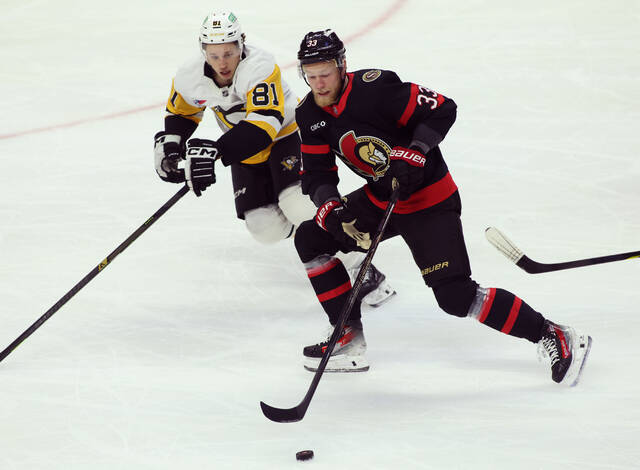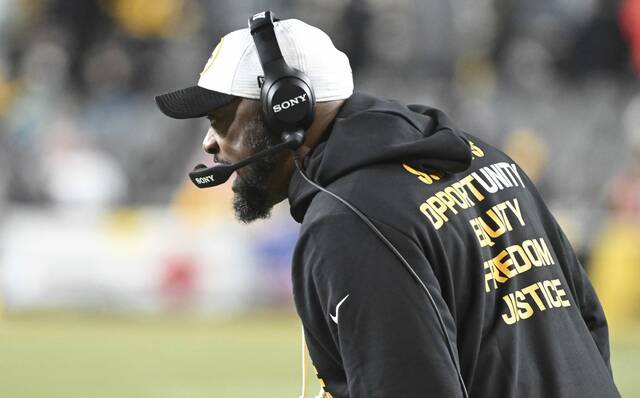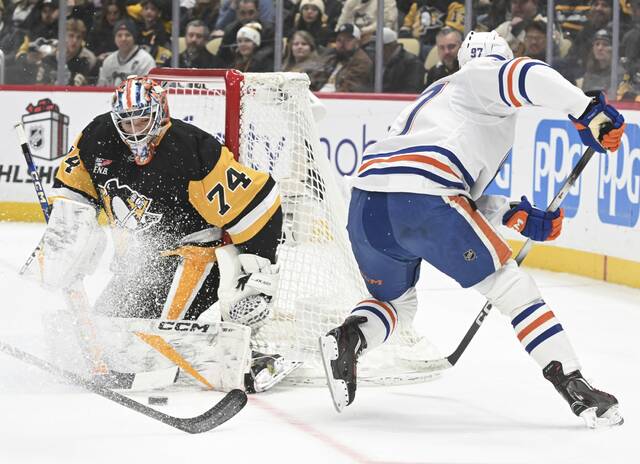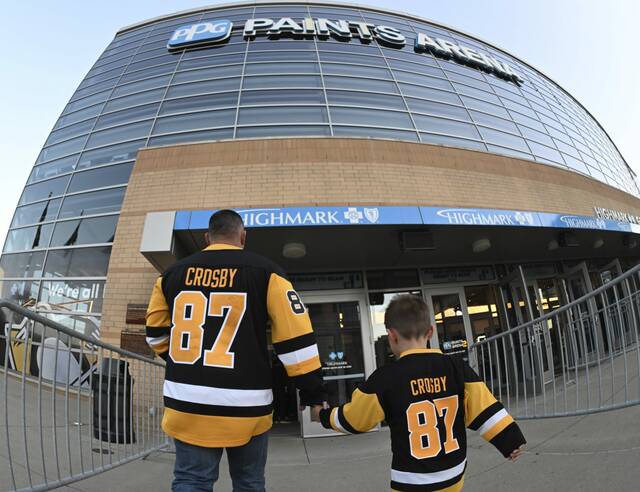While the NHL is on hold because of the ongoing coronavirus pandemic, the Tribune-Review will offer the Double Team project, an examination of the five best players who have contributed substantially to the Penguins and another franchise. For consideration, a player must have played at least the equivalent of a full season for each franchise. (Sorry, Jarome Iginla fans.)
Today, a look at the Oakland Seals/California Golden Seals/Cleveland Barons franchise. It might seem cruel to say this long-defunct franchise is lost to history, but it would also be fitting as the Seals/Golden Seals/Barons lost to just about everyone else. Part of the NHL’s 1967 expansion, the Seals were based in Oakland, Calif., but took on the California Golden Seals name in 1970 to appeal to fans in San Francisco. By 1976, the Golden Seals were sunk and moved to Cleveland, becoming the Barons. Even with that change, the franchise was still a bust and in 1978, it ceased operations, merging with the Minnesota North Stars. In 69 all-time games against the Seals/Golden Seals/Barons, the Penguins had a 35-16-18 record.
1. Gilles Meloche, goaltender
Meloche was the best player in the history of this franchise because, well, someone had to be. Acquired in a trade with the Chicago Black Hawks early in the 1971-72 season, Meloche was given a chance to play and despite his 16-25-13 record, he finished fourth in voting for the Calder Memorial Trophy as the league’s top rookie.
His career with the Golden Seals and Barons would follow a similar pattern in that he was good enough to play but not good enough to lift this woebegone franchise out of its stupor. In 155 games with the Golden Seals and Barons, Meloche had a 93-191-62 record.
After the merger with Minnesota, Meloche’s fortunes improved during a mostly successful seven-year run with the Minnesota North Stars. Just prior to the start of the 1985-86 season, he was traded to the Penguins at the age of 35. Largely platooning with the likes of Roberto Romano and Frank Pietrangelo behind some porous defenses, Meloche finished his 18-year career with three challenging seasons as a member of the Penguins.
Primarily due to his valiant but unsuccessful tenure with the Golden Seals/Barons franchise, Meloche was the NHL’s all-time leader in goaltending losses (351) at the time of his retirement.
2. Ron Stackhouse, defenseman
A second-round pick (No. 18 overall) by the Seals in the 1969 draft, Stackhouse put together a solid rookie season as a 21-year-old in 1970-71 with Oakland, putting up 32 points in 78 games. Despite that promising start, Stackouse was dealt to the Detroit Red Wings for forward Tom Webster in what proved to be a clunker of a trade as Webster only played seven games all-time for the Seals.
Stackhouse, on the other hand, continued to produce at a consistent rate for parts of three seasons in Detroit before he was traded to the Penguins midway through the 1973-74 campaign for defenseman Jack Lynch and a goaltender by the name of Jim Rutherford. It was with the Penguins that Stackhouse had his greatest success.
An offensive defenseman who fit in well during the free-flowing NHL of the 1970s, Stackhouse spent parts of nine seasons in Pittsburgh and became an All-Star in 1980.
His signature season of 1975-76 saw him put up 71 points (15 goals, 45 assists) in 80 games.
While Stackhouse was often criticized by fans for not being a physical player, he held most of the franchise’s offensive records for defenseman by the time he retired in 1982. Most of those marks have been surpassed by the likes of stars such as Paul Coffey or Kris Letang, but Stackhouse is still among the franchise’s overall leaders in points (343) and games played (621).
3. Earl Ingarfield, center
Having spent parts of nine seasons in New York, Ingarfield’s tenure as a member of the New York Rangers easily defined his NHL existence.
By the time the Penguins claimed him in the 1967 expansion draft, Ingarfield, then 33, was more of a name who would hopefully draw ticket sales than he was a player on the ice. Regardless, he contributed a solid 37 points in 50 games during the Penguins inaugural season of 1967-68.
At the start of 1968-69, he was named the Penguins’ second captain in franchise history but was traded to Oakland by midseason.
Spending parts of three seasons with the Seals/Golden Seals, Ingarfield put together a strong campaign in 1969-70 by scoring 21 goals and 45 points in 54 games at the age of 35.
He retired by 1971.
4. Wally Boyer, center
Boyer was the definition of a journeyman as an NHLer. He only played seven NHL seasons but he did so for four franchises.
Claimed by the Seals from the Black Hawks in the 1967 expansion draft, Boyer, who flourished in the AHL for most of his professional career, set a career-high as an NHLer with 74 games while contributing 33 points.
During the 1968 offseason, Boyer was traded to the Montreal Canadiens, who then flipped him to the Pittsburgh Penguins, the team with which Boyer had his most success as an NHLer.
In parts of four seasons, Boyer, a sturdy penalty killer, played in 203 games and scored 94 points. A member of the Penguins’ first playoff team in 1970, Boyer still shares the record for the fastest two goals in Penguins history, having scored twice within a span of seven seconds during a 5-3 road loss to the Red Wings on March, 5, 1970.
By 1972, Boyer joined the Winnipeg Jets of the World Hockey Association.
5. Stan Gilbertson, left winger
A strong scorer in the AHL, Gilbertson got a chance to play in the NHL thanks to expansion during the late 1960s and early 1970s. As a 27-year-old rookie with the Golden Seals, he put up a solid 32 points in 78 games.
Gilbertson played parts of four seasons for the Golden Seals, appearing in 235 games and scoring 88 points. Early in the 1974-75 campaign, he was traded to the St. Louis Blues along with forward Craig Patrick, a future general manager of the Penguins.
After bouncing between the Blues and Washington Capitals, Gilbertson was traded to the Penguins midway through the 1975-76 campaign. In 79 games that season, he put up career highs of 26 goals and 48 points while helping the Penguins reach the postseason. He followed that up by putting up 15 points in 67 games during 1976-77.
Gilbertson’s career came to a premature end at the age of 32 in September of 1977 due to an automobile accident in Rostraver that caused part of his right leg to be amputated.
Honorable mention: Charlie Burns, center; Rick Kessell, center; Charlie Simmer, left winger; Bob Stewart, left winger; John Stewart, left winger.









